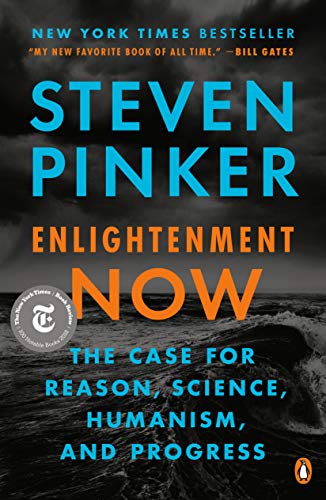
If you think the world is coming to an end, think again: people are living longer, healthier, freer, and happier lives, and while our problems are formidable, the solutions lie in the Enlightenment ideal of using reason and science.
Is the world really falling apart? Is the ideal of progress obsolete? In this elegant assessment of the human condition in the third millennium, cognitive scientist and public intellectual Steven Pinker urges us to step back from the gory headlines and prophecies of doom, which play to our psychological biases. Instead, follow the data: In seventy-five jaw-dropping graphs, Pinker shows that life, health, prosperity, safety, peace, knowledge, and happiness are on the rise, not just in the West, but worldwide. This progress is not the result of some cosmic force. It is a gift of the Enlightenment: the conviction that reason and science can enhance human flourishing.
Far from being a naïve hope, the Enlightenment, we now know, has worked. But more than ever, it needs a vigorous defense. The Enlightenment project swims against currents of human nature – tribalism, authoritarianism, demonization, magical thinking – which demagogues are all too willing to exploit. Many commentators, committed to political, religious, or romantic ideologies, fight a rearguard action against it. The result is a corrosive fatalism and a willingness to wreck the precious institutions of liberal democracy and global cooperation.
With intellectual depth and literary flair, Enlightenment Now makes the case for reason, science, and humanism: the ideals we need to confront our problems and continue our progress.
Bill Gates & Steven Pinker Discuss Enlightenment Now
People all over the world are living longer, healthier, and happier lives, so why do so many think things are getting worse? Bill Gates sat down with author Steven Pinker to discuss his book Enlightenment Now which provides a holistic picture of how and why the world is getting better.
Steven Pinker | Bill Gates on YouTube.
Enlightenment Now Quotes
“What is progress? You might think that the question is so subjective and culturally relative as to be forever unanswerable. In fact it’s one of the easier questions to answer.
Most people agree that life is better than death. Health is better than sickness. Sustenance is better than hunger. Wealth is better than poverty. Peace is better than war. Safety is better than danger. Freedom is better than tyranny. Equal rights are better than bigotry and discrimination. Literacy is better than illiteracy. Knowledge is better than ignorance. Intelligence is better than dull-wittedness. Happiness is better than misery. Opportunities to enjoy family, friends, culture, and nature are better than drudgery and monotony.
All these things can be measured. If they have increased over time, that is progress.”